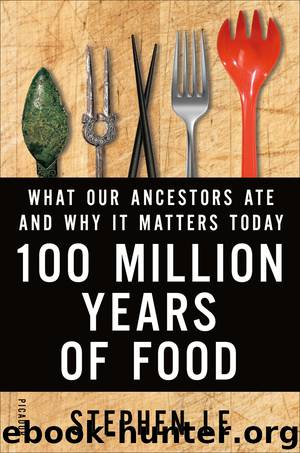100 Million Years of Food by Stephen Le

Author:Stephen Le
Language: eng
Format: epub
ISBN: 9781250050427
Publisher: Picador
THE FUTURE OF FOOD
When the hype is greater than the science it burns all of us.
—K. LANCE GOULD, quoted in Shari Roan, “A Slow Change of Heart”
Most people today agree that something is wrong with our lifestyle habits, but there is sharp disagreement among both experts and the public on what needs to be done to restore our health. Are today’s food and health activists on the right track or misguided? I met with three of the leading proponents of nutritional advice—Dr. Dean Ornish, a cardiologist and proponent of low-fat diets; Sally Fallon Morell, a booster of traditional American farm diets; and Mark Sisson, an ex-Ironman athlete and a blogger and writer on the Primal (Paleo) lifestyle—to see why smart people reached opposing perspectives on the optimal diet. I also visited food idealists in Australia, Canada, and the United States who, with courage and determination, are trying to change the way we live and eat or raise food, particularly foods that are more ecologically sustainable; happily, it turns out that eco-friendly foods are also more suitable for our nutritional needs. As we shall see in this chapter, however, these activists are being confronted with major hurdles due to the nature of capitalism and our fear of novel foods.
* * *
Dean Ornish is a busy man. Besides teaching medicine at the prestigious medical school at the University of California, San Francisco, Dr. Ornish was appointed by President Barack Obama to the White House Advisory Group on Prevention, Health Promotion, and Integrative and Public Health. He had previously been appointed to the White House Commission on Complementary and Alternative Medicine Policy by President Bill Clinton, and has served as “a physician consultant” to President Clinton since 1993 and to several members of Congress. Through his numerous books and articles, Dr. Ornish advises the public to eat less fat (preferably around 10 percent of their total daily calories), stay away from saturated fat and cholesterol, eat little meat, limit alcohol consumption, and eat a lot of whole grains. (In his other suggestions, such as eating vegetables and fruits, staying away from processed foods and sugar, spending time with loved ones, and exercising, Dr. Ornish is in agreement with most other food and health writers.) In several studies that he led, there is evidence that his low-fat/low-meat diets, in combination with moderate exercise, stress management, cessation of smoking, and group psychological therapy, lower the risk of heart disease without the use of lipid-reducing drugs.
This brings up three important questions. First, is it the low-fat and low-meat diet that does the trick in reducing heart disease, or are the lifestyle interventions of exercise, stress reduction, smoking cessation, and group therapy the real key? In conversation with Dr. Ornish, I point out the “Spanish paradox”: Spanish people consumed 30 percent more fat in 1980 than they had in 1966, particularly saturated fat (a 48 percent increase), yet heart disease decreased over the same period; in Japan, there was a similar postwar increase in fat and cholesterol consumption while heart disease also dropped.
Download
This site does not store any files on its server. We only index and link to content provided by other sites. Please contact the content providers to delete copyright contents if any and email us, we'll remove relevant links or contents immediately.
| Culinary Biographies | Essays |
| Food Industry | History |
| Reference |
A Court of Wings and Ruin by Sarah J. Maas(7785)
The Death of the Heart by Elizabeth Bowen(3596)
The Sprouting Book by Ann Wigmore(3574)
Better Homes and Gardens New Cookbook by Better Homes & Gardens(3567)
BraveTart by Stella Parks(3430)
Salt, Fat, Acid, Heat: Mastering the Elements of Good Cooking by Nosrat Samin(3130)
Sauces by James Peterson(3083)
Kitchen confidential by Anthony Bourdain(3070)
The Bread Bible by Rose Levy Beranbaum(3053)
Classic by Mary Berry(2997)
Solo Food by Janneke Vreugdenhil(2958)
Ottolenghi - The Cookbook by Yotam Ottolenghi(2918)
Martha Stewart's Baking Handbook by Martha Stewart(2843)
Day by Elie Wiesel(2765)
Betty Crocker's Good and Easy Cook Book by Betty Crocker(2704)
My Pantry by Alice Waters(2598)
The Plant Paradox by Dr. Steven R. Gundry M.D(2596)
The Kitchen Counter Cooking School by Kathleen Flinn(2505)
Hot Sauce Nation by Denver Nicks(2478)
